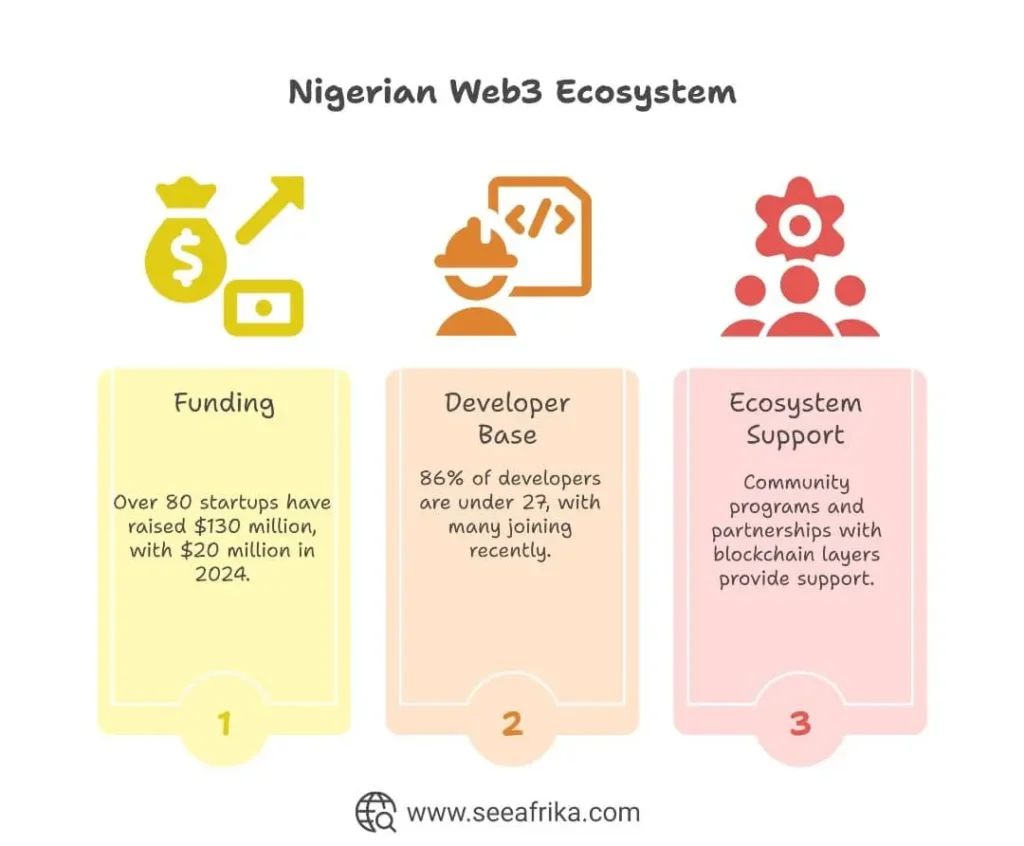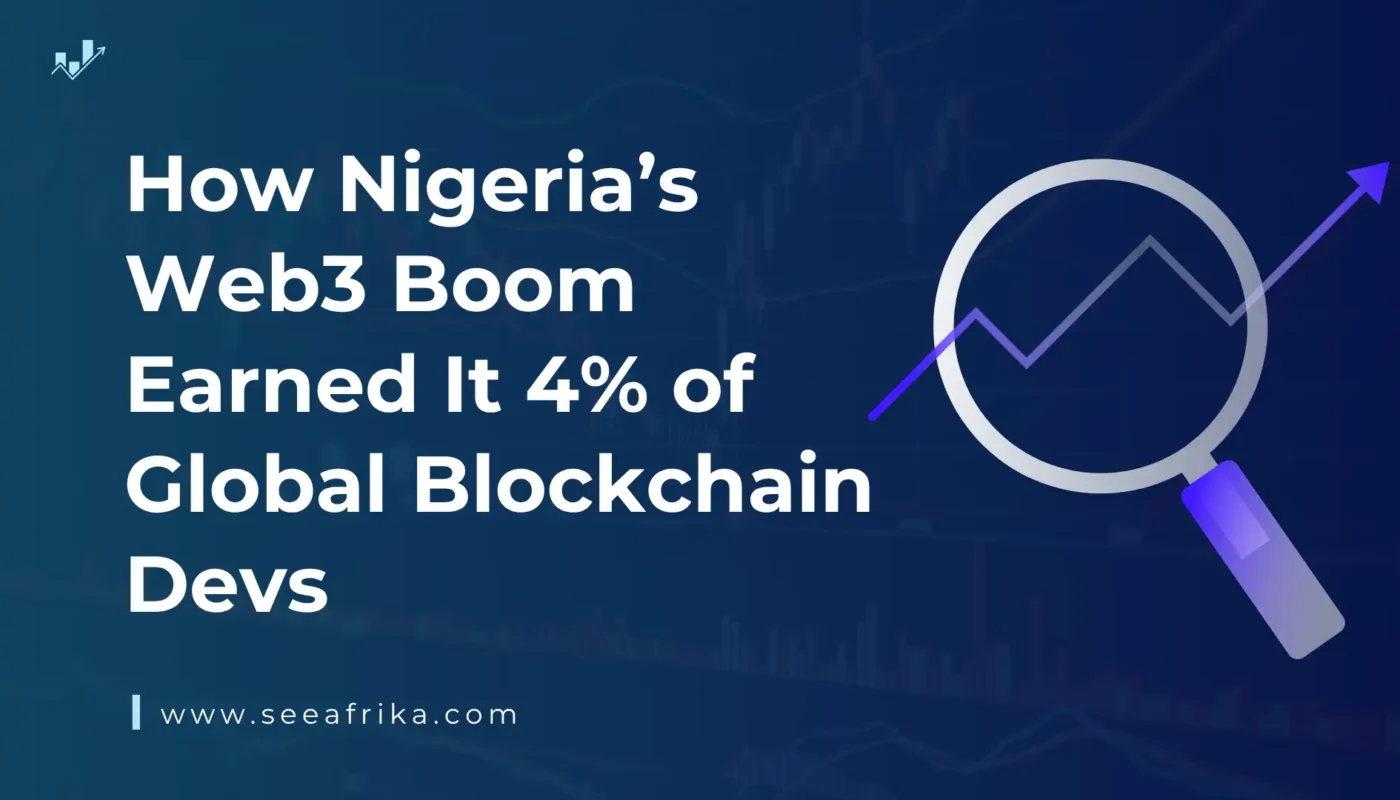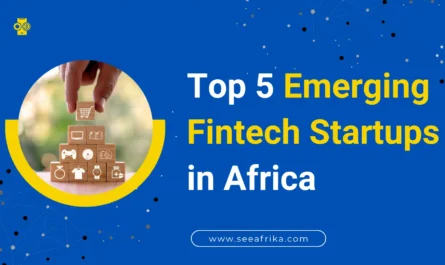Nigeria’s Web3 boom has soared impressively in 2024, earning the country a remarkable 4% share of all global new blockchain developers—the highest from any African nation. This surge marks Nigeria as Africa’s fastest-growing Web3 developer hub, placing it firmly on the global blockchain innovation map.
But how did Nigeria achieve this prominent position? What fuels this vibrant growth, and what does it mean for both tech and non-tech audiences? This blog unpacks every detail about Nigeria’s Web3 boom, demystifying its significance and the forces behind it.

The Rise of Nigeria’s Web3 Boom: A Snapshot
In 2024, Nigeria’s developer community reached 1.1 million individuals involved in Web3 and blockchain projects. This represented a 28% year-on-year (YoY) growth, driven by a youthful, ambitious, and entrepreneurial ecosystem. Nigeria accounted for 4% of all new global Web3 developers in 2024, surpassing every other African country by a wide margin.
This explosive growth grew on the back of:
- Over 80 Nigerian Web3 startups raising a combined $130 million in funding to date, with nearly $20 million raised in 2024 alone.
- A developer base where 86% are under 27 years old, with many joining in the last 12 months, indicating a steady inflow of fresh talent ready to build and innovate.
- Strong ecosystem support from community-led programs and bootcamps like Web3bridge, SuperteamNG, Web3Ladies, and partnerships with blockchain layers such as Solana, Base, and Starknet.

What is Web3 and Why Does Nigeria’s Boom Matter?
Web3 represents the next evolution of the internet emphasizing decentralization, blockchain technology, cryptocurrencies, and self-sovereign digital identities. It enables peer-to-peer networks and digital economic systems without relying on centralized platforms.
Nigeria’s rapid growth in this space means it is not only adopting Web3 but becoming a major contributor to building the technologies that will power this new internet era. This has implications for:
- Tech audiences: Demonstrating Nigeria’s maturity as a blockchain innovation hub with growing infrastructure, startup funding, and developer talent.
- Non-tech audiences: Indicating new economic opportunities, job creation, and Nigeria’s role in shaping decentralized finance, digital identity, and governance solutions that could transform many sectors.
Who Makes Up Nigeria’s Web3 Developer Boom?
Nigeria’s Web3 developer ecosystem is uniquely characterized by a young, dynamic, and highly entrepreneurial community:
- Age and New Entrants: About 86% are under 27, and over half joined the Web3 ecosystem in the past year alone. This rapid onboarding is partly due to accessible online resources, bootcamps, and communities.
- Student Involvement: Nearly half of developers are students, signaling strong future growth and continuous skill development.
- Employment Status: Only about 15% work full-time in Web3 roles, while a large portion are freelancers or founders. About 41% identify as freelancers, showing a flexible, gig-oriented workforce.
- Specializations: Smart contract development is a key skill with 21% focused exclusively on it, highlighting Nigeria’s technical depth and expertise in blockchain programming.
Why Has Nigeria’s Web3 Boom Accelerated?
Several factors combine to propel Nigeria’s rise as a Web3 powerhouse:
1. Strong Entrepreneurial Spirit
Nigeria’s Web3 boom is powered by a robust entrepreneurial spirit. Approximately 6% of Web3 developers identify as startup founders, representing a 35% increase in recent years. Over 80 Nigerian startups have raised more than $130 million, with $20 million raised in 2024 alone.
This influx of funding supports early-stage projects focused on blockchain infrastructure and decentralized finance. Community-led initiatives, such as Web3bridge and Web3Ladies, provide vital training, mentorship, and networking opportunities, helping founders build and scale their businesses.
The young and ambitious developer pool fuels this momentum—86% are under 27, and many are recent entrants to the field. The ecosystem thrives on flexible work models: only 15% hold full-time Web3 roles, while 41% work as freelancers, embracing a gig economy that fosters innovation and the creation of startups. This flexibility allows individuals to experiment, collaborate, and launch projects with less traditional employment constraints, reinforcing the entrepreneurial culture.
2. Access to Funding and Grants
Nigeria’s web3 boom is driven by a strong entrepreneurial culture and substantial funding that fuels innovation. In 2024, over 80 Nigerian Web3 startups have raised more than $130 million to date, including $20 million in that year alone. Most funding targeted early-stage projects focused on blockchain infrastructure and decentralized finance applications.
This boom is marked by a youthful and flexible developer base, where 86% of developers are under 27 and many work as freelancers or startup founders. Nigeria’s developer community grew by 28% year-on-year in 2024, reaching 1.1 million, and contributed 4% of all new global Web3 developers—the highest for any African country.
Supportive ecosystem grants from Layer 1 and Layer 2 blockchain protocols have lowered funding barriers and accelerated grassroots innovation. At the same time, stablecoin-powered financial tools addressing local economic challenges have attracted both users and investors.
3. Growing Blockchain Infrastructure & Financial Applications
The rapid growth of blockchain infrastructure and financial applications drives Nigeria’s Web3 boom. In 2024, startups raised $20 million, with $11 million going to infrastructure projects. This represents a 270% increase from the previous year. These projects focus on building networks and smart contracts that fit Nigeria’s unique needs.
Financial applications also drive Nigeria’s Web3 boom. The country ranked second globally in crypto use in 2024. Stablecoin transactions reached nearly $3 billion in the first quarter alone. These tools address currency volatility, inflation, and cross-border payments.

4. Community and Educational Programs
Nigeria’s Web3 boom is strongly supported by community and educational programs that empower young Nigerians with the skills and knowledge necessary for blockchain technology.
Programs like Web3bridge and Web3Ladies offer hands-on bootcamps and training sessions where participants learn to build decentralized applications, smart contracts, and understand Web3 fundamentals. These initiatives not only teach tech skills but also provide mentorship, networking, and real-world project experience, fueling the growth of Nigeria’s Web3 boom by lowering barriers for newcomers and enhancing developer expertise.
Additionally, many universities and organizations are establishing dedicated Web3 hubs across Nigeria to foster collaboration, innovation, and learning. These hubs provide physical spaces, resources like high-speed internet and computers, and host events such as hackathons, workshops, and AMAs centered on blockchain topics.
5. Regulatory Developments
Nigeria’s Web3 boom has been significantly influenced by recent regulatory developments, which have marked a major shift from a total ban to a more structured framework for digital assets.
In late 2023, the Central Bank of Nigeria (CBN) lifted its previous ban on crypto banking transactions, allowing licensed virtual asset service providers (VASPs) to operate naira-denominated bank accounts. This new regulation aims to integrate cryptocurrency transactions into Nigeria’s formal banking sector while imposing strict controls, including prohibiting cash withdrawals and limiting certain types of withdrawals to two per quarter.
This regulatory clarity has helped fuel Nigeria’s Web3 boom by creating a safer environment for startups and investors in the blockchain space. VASPs must register with the Securities and Exchange Commission (SEC) and comply with anti-money laundering (AML) policies, as well as provide detailed ownership and operational disclosures.
Also read:
The Impact of Nigeria’s Web3 Boom — What You Need to Know
A. For Tech Professionals
- Opportunity Hub: Nigeria ranks among the top countries globally for blockchain innovation, offering abundant opportunities for developers, founders, and investors.
- Technical Growth: The ecosystem’s technical capability is sharpening, especially in smart contracts, DeFi, and blockchain infrastructure.
- Emerging Ecosystem: Nigeria’s Web3 startups focus on crucial infrastructure and financial products, setting the foundation for future expansion beyond entertainment and gaming.
B. For Businesses and Investors
- Investment Potential: Nigerian startups have attracted growing venture capital and ecosystem grants, signaling confidence in their innovations.
- Market Growth: Nigeria is Africa’s largest and fastest-growing Web3 market, with significant crypto adoption (ranked second globally by Chainalysis in 2024).
- Ecosystem Support: Programs and grants foster more sustainable startups, moving beyond speculative investments.
C. For Everyday Nigerians
- New Economic Models: Web3 offers alternatives to traditional banking, enabling access to stablecoins, remittances, and decentralized finance tools.
- Jobs and Skills: The Web3 boom is creating jobs, particularly for young people and freelancers worldwide, paid often in crypto assets.
- Digital Inclusion: Blockchain’s use in public infrastructure can enhance transparency, voting, and digital identity systems.
Challenges That Nigeria’s Web3 Boom Still Faces
Nigeria’s surge is remarkable but has obstacles that need attention:
- Employment Fluidity & Pay Gaps: Only a small fraction of developers hold full-time Web3 jobs. Many earn below global standards due to local market dynamics and currency depreciation.
- Regulatory Uncertainty: Although improved, regulations remain evolving, causing some hesitation among traditional investors and businesses.
- Infrastructure and Funding Needs: Despite rising grants, more sustained and larger funding rounds are necessary to scale startups beyond early stages.
Looking Forward: The Future of Nigeria’s Web3 Boom
Nigeria’s web3 boom is poised for sustained rapid growth. The country’s young and skilled developer base continues to expand, with a projected yearly increase of around 7-8% through 2030. Strong ecosystem support from blockchain layers and community-driven programs will continue to fuel innovation and startup creation.
Nigeria’s Web3 startups are increasingly building real-world decentralized finance (DeFi) applications, digital identity solutions, and public service platforms, moving beyond experimentation to deliver scalable solutions tailored to both local and global needs.
Regulatory progress and growing investor interest are also shaping the future of Nigeria’s web3 boom. Recent clarity around virtual asset service providers (VASPs) has improved the business environment, encouraging more startups and institutional participation.
Large Web3 events and conferences in Nigeria are fostering collaboration among policymakers, the private sector, and developers, signaling the maturity of the ecosystem.
Final Thoughts
Nigeria’s Web3 boom illustrates how vibrant local talent, entrepreneurial drive, supportive ecosystems, and strategic funding can propel a country to the forefront of global technological innovation.
For tech insiders and everyday readers alike, understanding this boom means recognizing Nigeria’s potential to shape the future of finance, governance, and digital infrastructure on a global scale. As this boom continues, Nigeria’s role as a Web3 powerhouse will deepen, presenting exciting opportunities and challenges for all stakeholders.




